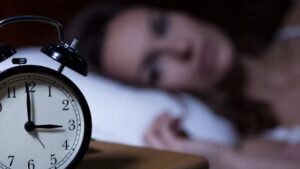Sleep and ADHD
Disclosure: By clicking on the product links in this article, Mattress Nerd may receive a commission fee at no cost to you, the reader. Read full disclosure statement.
Medically Reviewed By Dr. Brandi Bolling: Triple Board-Certified pediatrician, psychiatrist, and child & adolescent psychiatrist and ADHD expert currently working at Rudolph Bolling Psychiatry.
Physicians recommend anywhere from 7 to 9 hours of sleep each night to avert daytime fatigue and maintain focus, energy, and clarity. Yet, for those with attention deficit hyperactivity disorder (ADHD), efficient and consistent rest can be hard to come by.
To address the lack of sleep in some individuals with ADHD it is important to understand the different factors contributing to these sleep problems. This guide will address the factors that lead to sleeplessness among people with ADHD and will give practical ways to alleviate these problems.
Understanding ADHD
Let’s start at the beginning: What is ADHD, and what are its symptoms?
ADHD is a common condition that affects children and adults. The basic symptoms associated with ADHD include:
- Inattention and inability to focus
- Hyperactivity (a tendency toward movement, difficulty sitting still)
- Impulsivity and rash decision-making
While researchers have not yet pinpointed the exact cause of ADHD, it is generally assumed to have a strong genetic component.
Link Between ADHD and Trouble Sleeping
Both ADHD itself and the medications used to treat it can be linked with insomnia and sleeplessness, and while many people with ADHD have a hard time sleeping, it’s not always for the same reason. The good news is that no matter the root of insomnia, there are treatments or lifestyle changes that can make a huge difference. The first step is identifying the specific cause of sleeplessness.
Here are some factors to consider:
ADHD Medications
- Many of the most commonly prescribed ADHD medications are stimulants, which means they are designed to sharpen the mind and provide clarity and focus. While these effects can be helpful at school or work, they are often counterproductive when trying to fall asleep at night. (It’s important to note that not everyone responds to stimulants in this way).
- The good news here is that there is a broad spectrum of medications that can be used to treat ADHD, some of which are non-stimulants. If you believe your ADHD prescription is keeping you up at night, ask your doctor about trying a different kind of medication.
Issues with Circadian Rhythm
- Circadian rhythm refers to your body’s internal clock. Your circadian rhythm consists of the ways your hormones cause the body to respond to daylight and nightfall, providing alertness in the morning and drowsiness at night.
- A healthy circadian rhythm is essential for ensuring a good night’s rest, but it’s common for those with ADHD to have their internal body clock disrupted.
According to one study, “circadian rhythm delay and greater evening alertness disrupts sleep (i.e., difficulties initiating and maintaining sleep), results in accumulating sleep debt and daytime sleepiness, and interferes with the timing of meals and activity patterns, which in turn may increase ADHD severity.”
However, some simple steps can help restore a proper circadian rhythm, including the use of supplemental melatonin as well as a decrease in blue light exposure.

Tendency to Hyperfocus
- Another common symptom for those with ADHD is the tendency to hyperfocus. Individuals can become so focused on a task or challenge at hand that they do not register their sleepiness, and thus can’t “turn off their brain” for a good night’s rest.
- One of the best ways to address hyperfocus is to create a schedule for activities that require a lot of attention and mental stimulation, getting them out of the way earlier in the day to allow yourself to have plenty of time to unwind and disengage before bed.
Alcohol
- Many adults use alcohol as a way of coping with their ADHD. In fact, among adults who seek treatment for drug or alcohol abuse, about 25 percent exhibit ADHD symptoms.
- It is also important to mention that individuals with ADHD are more likely to experience impulsivity and behavioral problems, which can sometimes contribute to the abuse of drugs and alcohol.
- One of the many problems with alcohol abuse is that it can sometimes have a stimulating effect; even among those who experience drowsiness when they drink, the sleep that follows is usually not very restful or restorative. Alcohol moderation can often yield a positive effect on sleep patterns.
Caffeine
- Many adults with ADHD find that caffeine helps improve their clarity and focus. While there’s nothing wrong per se about moderate caffeine use, it’s important to remember that caffeine is a stimulant and can contribute to insomnia.
- To address sleep issues, limit your caffeine intake, and only consume caffeine in the morning or early afternoon.
Restless Leg Syndrome
- Among those who have ADHD, about 44 percent also have the symptoms of Restless Leg Syndrome (RLS), which include discomfort in the limbs and an uncontrollable urge to move them throughout the night.
- Several treatments exist to lessen RLS symptoms, including warm baths and the use of ice packs, foot wraps, and general sleep hygiene.
Sleep Apnea
- About a quarter of all people with ADHD also have sleep apnea, which disrupts breathing and makes it nearly impossible to get truly restorative sleep.
- Sleep apnea is an extremely serious condition, but there are many ways to address it, including through the right sleeping position (on the side, or on the back with an elevated head) or a CPAP machine.
- If you exhibit sleep apnea symptoms, including loud snoring, contact your doctor to find a treatment plan that works best for you.
How Does ADHD Impact Sleep Among Different Age Groups?
Children
ADHD can cause different kinds of sleep disruptions based on age demographics. One study affirms that there are “complex and probably multidirectional” connections between ADHD and insomnia in children.
There are several mitigating factors here. For example, children are often prescribed medications that have a stimulating effect. Simple modifications to the treatment plan can help alleviate symptoms of insomnia. Additionally, because kids with ADHD are often faced with a disrupted circadian rhythm, it is important to create a very dark environment in which they can sleep; this may mean unplugging any lights or electronics that are in their room.’’
“Simply put, just as ADHD causes children’s bodies to move throughout the day, it also causes their minds to continue moving at night. Many children use sleep aids to help initiate sleep induction and maintenance. Without proper sleep, children can have daytime sedation, which further worsens inattention as seen in ADHD, and that can lead to poor academic performance, lowered self-esteem, and irritability.” – Dr. Brandi Bolling, Rudolph Bolling Psychiatry

Adolescents
Adolescents with ADHD may also encounter difficulties falling asleep or staying asleep. One study finds that 74 percent of adolescents with ADHD also experience “initial insomnia, nocturnal awakenings, and non-restorative or restless sleep.” Meanwhile, other studies show that teens who have ADHD may need extra sleep to curb some of their symptoms and ensure greater clarity and focus.
Related: Best Mattress for Teens
Again, there are plenty of suggested treatments and remedies, including: managing stimulant medication levels, ensuring a consistent bedtime routine, investing in a comfortable mattress, and limiting evening media consumption.
Adults
In many cases, ADHD can last into adulthood, and so can the sleep problems associated with it. As many as half of adults with ADHD say they don’t get enough sleep at night. The specific factors that lead to sleeplessness include many of the issues highlighted above, including an increased risk of sleep apnea, RLS, and hyperfocus. Adults can combat these problems with soothing and consistent bedtime routines, scrupulous monitoring of stimulants and alcohol, and treatments for comorbidities (for example, a CPAP for sleep apnea, or antihistamines for constricted breathing).
In general, the impact of ADHD on sleep changes as the child ages. Younger children with ADHD tend to be more hyperactive, and therefore are more likely to move about and show signs of restlessness as they attempt to fall asleep. Adolescents with ADHD tend to have less hyperactive symptoms during the day but still have problems staying asleep through the night. Because of their age, adolescents can stay awake longer; however, later bedtimes may complicate the picture of a child who has trouble falling asleep. Developmentally, adolescents often brag about needing less sleep than younger children but a full night’s rest is still important for them. – Dr. Brandi Bolling, Rudolph Bolling Psychiatry
What to Avoid to Combat Sleeplessness
Alcohol & Caffeine
One of the best ways to improve your restfulness is to limit the consumption of alcohol and caffeine. Caffeine, of course, is a well-known stimulant; meanwhile, alcohol can make sleep less productive, increasing restlessness throughout the night. The best practices are to avoid caffeine beyond the early afternoon and to not drink any alcohol within an hour or two of bedtime.
Sugar and Sweets
Sugar can disrupt sleep on a number of levels: It reduces sleep quality, stimulates cravings, increases inflammation, and agitates the digestive system. Maintaining a low-sugar, high-fiber diet, and minimizing processed foods can help curtail these ill effects.
Overstimulation Before Bedtime
Those with ADHD typically need some time to let their minds wind down before bed. Too much media consumption and mentally/physically engaging activities may lead to hyperfocus and lead to a lack of sleep. To combat this issue, seek a relaxing bedtime routine that helps prepare the mind and body for rest.
Technology
The blue light emitted by electronic devices can have a disruptive effect on circadian rhythms. It’s best to remove all electronics from the bedroom and turn off all devices an hour before bed to ensure a good night’s rest. Leave time at the end of the day for relaxation, whether its low-intensity yoga, a hot bath, or just some time spent reading a book.

Additional Things to Try For a Better Night’s Sleep
Make Sure Your Bedroom is Conducive to Good Sleep
It’s always harder to sleep in a room that’s uncomfortable. Some tips include keeping the temperature reasonably low, ensuring the room is dark, and making sure you have a good mattress supports your preferred sleep position.
Daily Exercise
A little bit of daily exercise (30 minutes to an hour) helps tire the body and mind, preparing them for rest; it’s essential to get this exercise earlier in the day if possible, as exercise right before bedtime will only cause excitement and may be counterproductive. Avoid exercise in an hour or two before bedtime.
Consider a Sleep Supplement
Finally, note that there are many sleep supplements that can help induce drowsiness naturally and holistically. One good example is Melatonin, the hormone that regulates sleep. In addition to taking supplements, there are also steps you can take to regulate your body’s natural melatonin production better.
The Takeaway
ADHD can sometimes cause sleeping problems, but these challenges don’t have to be insurmountable and can often be addressed with a few lifestyle changes and your doctor’s help.


